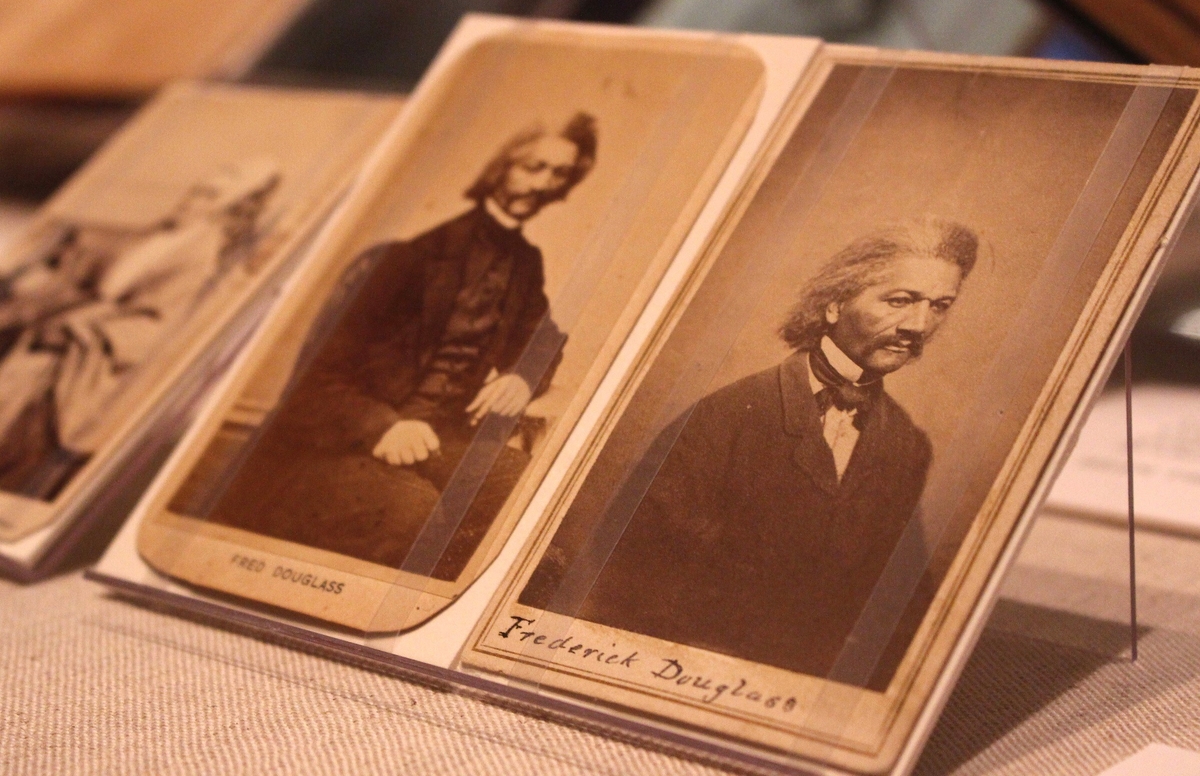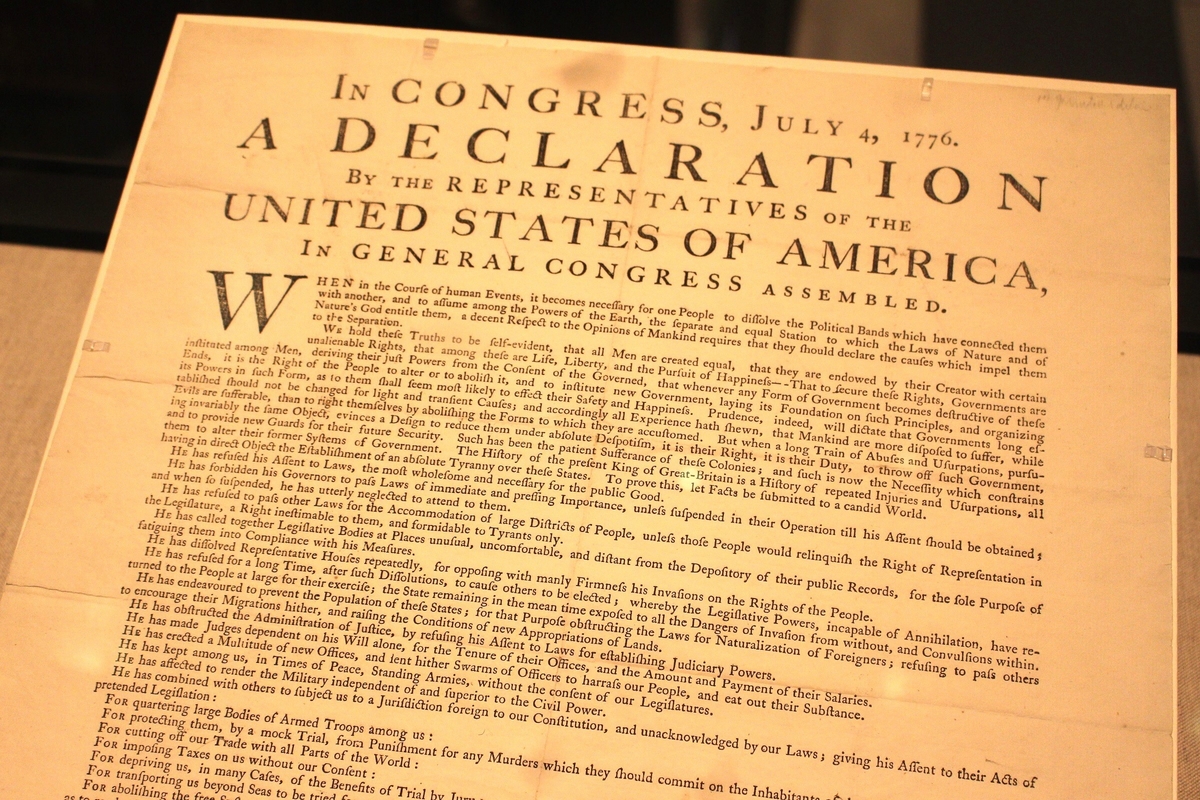
Carte-de-visite images of Frederick Douglass, from 1860 and 1865.

Local readers at the Beinecke on Tuesday: George Miles, Charles Warner Jr., Babz Rawls-Ivy, Dee Marshall, Trina Lucky ...

... Clifton Graves Jr., Erik Clemons, and Meghan Beirne.
Clifton Graves Jr.‘s voice boomed throughout the cavernous, marble-enclosed library — his eyes locked with the audience’s, his right hand raised in admonition, his words traveling 170 years from past to present.
“What, to the American slave, is your 4th of July?” he asked. “I answer; a day that reveals to him, more than all other days in the year, the gross injustice and cruelty to which he is the constant victim.”
Graves, a longtime local attorney and the city’s probate court judge, uttered those words — and temporarily, rhetorically, transformed into 19th-century abolitionist, author and orator Frederick Douglass — on Tuesday afternoon in the second floor gallery space of Yale’s Beinecke Rare Book & Manuscript Library downtown.
He joined a handful of other local readers — including Erik Clemons, Babz Rawls-Ivy, Dee Marshall, Trina Lucky, Charles Warner Jr., Tubyez Cropper, Meghan Beirne, and George Miles — before a 50-person audience for what has quickly become an annual Independence Day-adjacent tradition at the Beinecke.
That is: a public reading of Douglass’s July 5, 1852 oration, “What, to the American slave, is your Fourth of July?” alongside that of the Declaration of Independence of July 4, 1776. (Click here, here, and here for articles about previous years’ events.)

Beinecke community engagement staffers Michael Morand and Tubyez Cropper, with one of 20 extant "Dunlap broadsides" of the Declaration of Independence of July 4, 1776.
The selection of “essential texts of our nation” — as Beinecke Director of Community Engagement Michael Morand put it at the top of the program — that were read aloud in full or in part expanded to include a 1780s-era petition from a group of enslaved New Haveners to the Connecticut General Assembly, the introduction to the 1825 autobiography of fugitive slave and New Havener William Grimes, and the Seneca Falls Declaration of Sentiments from 1848.
Original copies of all of these documents (except for the 1780s petition) sit within the Beinecke’s collection and are available for public viewing, to Yalies and non-Yalies alike.
Read aloud side by side by side with one another on Tuesday, they transported listeners to the very core of this country’s past and present, illuminating the ideals on which this nation was founded and the hypocrisy with which so much of its history has unfurled.
“These texts are at once timely and timeless,” Morand said. “They show that words matter, that ideas matter, that ideals matter, that actions matter. … We hope these living documents are resources to use, remember, learn, and contribute, individually and collectively, to the ongoing building of a more perfect union.”
Cropper, a New Haven native and Amistad High School graduate who also works at the Beinecke, agreed with Morand that a close reading of these documents serves as a powerful counter to what Gore Vidal once dubbed “the United States of Amnesia.”
“Let the words that you heard today, let them change this [country] into the United States of Acknowledgment,” he said. “The United States of Learning. The United States of Caring. The United States of Prosperity.”
After the nearly two-hour reading had concluded, Graves reflected on how Douglass’s 1852 speech about the state-sanctioned harm faced by Black Americans and the 1848 Seneca Falls declaration about the deprivation of women’s liberty resonate today in the wake of the police murder of George Floyd and the Supreme Court’s overturning of Roe v. Wade.
“We still have a ways to go,” he said.
"The Very Ring-Bolt In The Chain Of Your Yet Undeveloped Destiny"

A 1776 "Dunlap broadside" printing of the Declaration of Independence.

At Tuesday's reading at the Beinecke.
So. What did these century-spanning texts say? And how did they speak to one another when read aloud one after the other on Tuesday?
To this listener, a number of political and rhetorical motifs returned again and again over the course of the event.
For one, they all contrasted an allegiance to universal political and philosophical principles with historical events and grievances specific to the time and place in which they were written.
The Declaration of Independence’s “We hold these truths to be self-evident that all men are created equal” is followed by a castigation of King George III for “cutting off our trade with all parts of the world” and for “imposing taxes on us without our consent.”
Douglass’s 1852 oration’s heralding of the 4th of July as “the very ring-bolt in the chain of your yet undeveloped destiny” stands alongside a detailed critique of the Fugitive Slave Act of 1850.
“We hold these truths to be self-evidenct that all men and women are created equal,” the Seneca Falls declaration begins, before lambasting the then-current state of American political life that deprived women of the right to vote and that “compelled her to submit to laws in the formation of which she had no voice.”
The documents also underscored just how much the various authors’ appeals to an American conception of freedom were grounded in what Cropper, reading from an introduction written by Yale historian David Blight for the 1780s petition, described as an Enlightenment-era conception of natural rights as well as a religious commitment to moral inclusion.
“Gentlemen, is this to be right and justice? Is this a free country? No, it’s murder,” Cropper read from the 1780s petition by enslaved New Haveners, followed soon by “We that can live, pray let us live.”
And Douglass, speaking about the 72 crimes that the State of Virginia listed as punishable by death if committed by a Black man, said: “What is this but the acknowledgment that the slave is a moral, intellectual, and responsible being? … When the dogs in your streets, when the fowls of the air, when the cattle on your hills, when the fish of the sea, and the reptiles that crawl, shall be unable to distinguish the slave from a brute, then will I argue with you that the slave is a man!”

And they all pointed time and time again to how the reality of American history has failed its founding liberatory ideals, and must be changed through diligence, commitment, courage, and a clear-sighted understanding of what has come before.
“I would in my will, leave my skin a legacy to the government, desiring that it might be taken off and made into parchment, and then bind the constitution of glorious happy and free America,” Grimes wrote in his 1825 autobiography. “Let the skin of an American slave bind the charter of American Liberty.”
And at Seneca Falls: “Now, in view of this entire disfranchisement of one-half the people of this country, their social and religious degradation, — in view of the unjust laws above mentioned, and because women do feel themselves aggrieved, oppressed, and fraudulently deprived of their most sacred rights, we insist that they have immediate admission to all the rights and privileges which belong to them as citizens of these United States.”
And in Douglass’s 1852 speech in Rochester, N.Y.: To the American slave, “your celebration of the 4th of July] is a sham; your boasted liberty, an unholy license; your national greatness, swelling vanity; your sounds of rejoicing are empty and heartless; your denunciation of tyrants, brass fronted impudence; your shouts of liberty and equality, hollow mockery; your prayers and hymns, your sermons and thanksgivings, with all your religious parade and solemnity, are, to him, mere bombast, fraud, deception, impiety, and hypocrisy — a thin veil to cover up crimes which would disgrace a nation of savages. There is not a nation on the earth guilty of practices more shocking and bloody than are the people of the United States at this very hour.”
On Tuesday, the final reader of the afternoon, Trina Lucky, concluded Douglass’s speech with the following words: “Allow me to say, in conclusion, notwithstanding the dark picture I have this day presented, of the state of the nation, I do not despair of this country. There are forces in operation which must inevitably work the downfall of slavery. “The arm of the Lord is not shortened,” and the doom of slavery is certain.”

Outside of the Beinecke's ground floor.
Hearing those words Tuesday afternoon, this reporter couldn’t help but think of still another luminary of Black American literary and political thought.
A man whose words were not included in Tuesday’s reading lineup inside the Beinecke, but whose portrait photograph is posted outside of the building, in between those of Langston Hughes, Margaret Bonds, Marian Anderson, and Richard Wright.
“I love America more than any other country in the world,” James Baldwin wrote in 1955, “and, exactly for this reason, I insist on the right to criticize her perpetually.”




This remains one of my favorite things to do! I love folks coming out wanting to hear these words for contemplation and discernment.
This is indeed a most important time! Thanks Tom Breen!